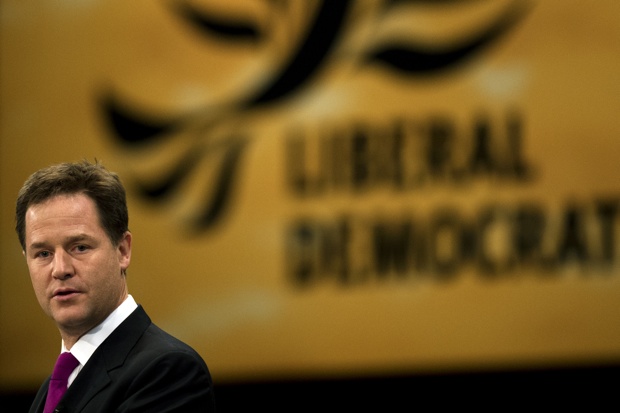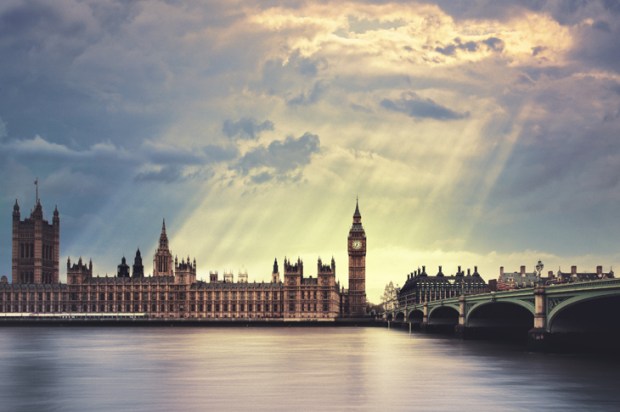This will be the coalition’s last full year, and it is remarkable how few people are talking about how it will all end. Last January, every conversation in Westminster was about when the two parties would disengage. Tory ministers were eyeing up the jobs that would be available once their coalition partners had left the cabinet table, Liberal Democrats mused on the ways that, once freed from the chains of office, they could demonstrate that they were a truly independent force. Now such chatter has gone. Instead, troops on both sides reluctantly accept that the coalition will continue until the election is called.
What’s changed? It’s all to do with Nick Clegg. His position is now the strongest it has been since his party entered -government, and he’s convinced that walking out early would damage the public’s view both of the Lib Dems and of coalitions in general. Not all his cabinet colleagues agree, of course. Vince Cable might prefer to leave government several months before the election, so that the Lib Dems can establish ‘equidistance’ between the two main parties. But after the job that Clegg’s allies did on him at last year’s party conference in Glasgow, Cable is keeping his head down.
Even so, you can expect the coalition to look and feel different in 2014. Clegg and Cameron will each spend more time talking about what their parties think and less about the government’s shared position. They have to show that they are governing competently together but at the same time emphasise their distinctiveness.
Emphasising distinctiveness is a more urgent matter for the Liberal Democrats. The risk they face at the next election is that voters who liked the government will back the Tories, and those who didn’t will go for Labour. They have to find ways to show the electorate that they are making a difference to what the coalition does.
The Tories, meanwhile, are more than happy to see the Lib Dems written out of the script. Ministers were told at a recent Tory political cabinet that they must not complain about what their coalition partners are stopping them doing — that makes them look impotent — but instead talk about what the Tories would do on their own. They want the election to be a straight choice between David Cameron and Ed Miliband. This, they believe, is the best way to maximise their vote and squeeze down Ukip’s.
The Liberal Democrats, though, are confident that they can stay in the picture. ‘Every time they write us out of the script,’ one Clegg confidant declares, ‘we’ll write ourselves back in.’ And the easiest way to do that is by saying no. When the Liberal Democrats block something, it’s news, particularly if they goad the Tories into a response.
It should worry Cameron and his cabinet colleagues, for example, that Clegg’s -circle speak so fondly of the coalition row a few months back about ‘qualified teachers’. In truth, the fight wasn’t entirely intentional. Clegg, trying to carve out some distinctive turf on education, simply reiterated the Lib Dem policy that even teachers in free schools had to be state-certified. But someone forgot properly to warn the Tories, who took it as an attack on agreed coalition policy. Both No. 10 and those close to Michael Gove screamed blue murder. For Clegg’s lot, it was a great, if unexpected, success. The tussle gave them ‘cut-through’ on education, an issue the Tories had owned within the coalition, and showed Lib Dem voters in the public sector that the party was still standing up for them against the Tories’ reforming zeal.
Some of Clegg’s intellectual supporters worry that criticising from within risks reviving the dangerous question of whether Clegg actually stands for anything. It could, they fear, confirm the voters’ sense that Liberal Democrats speak with forked tongues. They also worry that it is unsustainable for their ministers — as with David Laws on the teaching question — to be left defending in Parliament policies with which their party has publicly disagreed.
Many Tory backbenchers want the Lib Dems not just out of the script but out of government. They dream of persuading Cameron to adopt positions that would force his coalition partners to quit. That, one senior backbencher explains, is partly why so many Tory MPs signed the motion to unilaterally (and illegally) extend immigration transition controls on Romanian and Bulgarians. I’m told we can expect plenty more freelance operations of this sort in the coming months — indeed, if Ukip beats the Conservatives in the European elections in May, they could become a defining feature of the second half of the year.
The Liberal Democrats want to govern with the Tories while persuading the public that they could work equally well with Labour. It will be a difficult trick to pull off. When I pressed one Liberal Democrat on whether he really didn’t care whether the Chancellor was George Osborne or Ed Balls, he blushed deepest red. But the leadership believes that equivocation is electorally imperative. Their current voters are evenly split on the question of their preferred coalition partner. The Liberal Democrat campaign will try to squeeze the Labour vote in Tory-leaning seats and the Tory vote in Labour-leaning ones. As one operative puts it, ‘You just have to like us more than the big party you dislike most.’
What is keeping Liberal Democrat spirits up is the belief that, one way or another, they will be in government again after the next election. They are not alone in thinking this. One Tory number-cruncher recently worked up a detailed general-election projection which factored in the usual swing back towards the governing party, individual seat data and the likely Tory squeeze on Ukip. The predicted result: 292 Tory seats and 292 Labour ones, and the Liberal Democrats once again holding the balance of power.
Got something to add? Join the discussion and comment below.
Get 10 issues for just $10
Subscribe to The Spectator Australia today for the next 10 magazine issues, plus full online access, for just $10.
You might disagree with half of it, but you’ll enjoy reading all of it. Try your first month for free, then just $2 a week for the remainder of your first year.















Comments
Don't miss out
Join the conversation with other Spectator Australia readers. Subscribe to leave a comment.
SUBSCRIBEAlready a subscriber? Log in